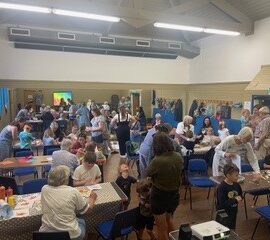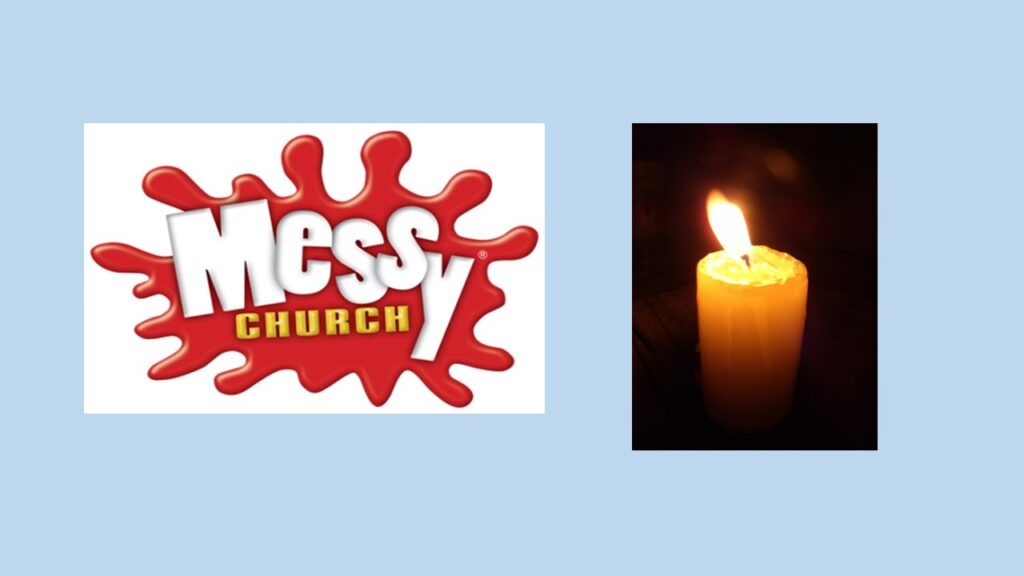Ever since the Messy Church International Conference just over a month ago, I have been wondering about something that George Lings said to us. Maybe you were there or have listened to his talks online since. George drew some parallels between fresh expressions of church and the monastic movement of the Middle Ages, citing the seven sacred spaces of a monastery that remind us, among other thing, that church is much more than just the gathered worship in the chapel.
Now Messy Church has been doing just that because Messy worship is definitely not just the gathered time of celebration but spills over into the conversations during ‘the work’ of the activity tables and at the refectory meal, in small groups and large. However, there is one monastic sacred space that is hard to find in Messy Church and that is ‘the cell’, where the monk retreats to be on his own with God in prayer and reflection. George quoted the Desert Fathers who claim that ‘the cell will teach you everything’ but how on earth can that be part of the communal, messy togetherness in Messy Church?
Whenever a group of Christians gather together as church, this is an opportunity to encounter God both in and between each other as individuals as well as experiencing the presence of God in community. In this sense Messy Church is all ‘sacred space’ for meeting with God, but it is less usually a place for an individual to do so on his/her own. Indeed, traditionally sacred space has been understood as somewhere apart from the hustle and bustle of everyday life, where individuals can encounter God, usually in silence and through exercising personal spiritual disciplines. Messy Church with its emphasis on community and togetherness in worship struggles by its very nature to offer this sort of sacred space. So should we, as George suggests, be addressing this?
Over the centuries, particularly in the more recent history of the Protestant Christians, there has been an accepted understanding that personal spirituality should also be developed through private prayer and personal spiritual practices at home in a ‘quiet time’ with God. Indeed, even in the gathered worship of Sunday church, most of the time Christians worship and listen as individuals, even when they say the same words or hear the same sermon as those around them. In fact, usually we are all also facing forward with little or no shared conversation until after the service is over. Messy Church worship contrasts hugely with this approach.
Encountering God in Messy Church is almost exclusively a community experience, whether it is through the conversations around the activity tables, during participation in the Bible story, via the singing and prayers during the celebration, or chatting over the meal. In fact, Messy Church offers a full two hours of opportunities to meet with God in and between people who are on a shared journey of spiritual discovery together.
But is this enough for individual faith development? Is an important dimension of our discipleship missing if Messy Church can’t also offer opportunities, teaching or examples of how to be a Christian ‘on our own’ with God? With its welcome emphasis on becoming Christian in community, is Messy Church in danger of losing some of the traditional ways by which we as individuals need to be rooted in a personal faith of our own?
Maybe Messy Church also needs to find ways of encouraging individual sacred space in order to nurture the personal rather than the communal dimension of Christianity. The closest most Messy Churches get to this at the moment is the provision of a prayer space or simple prayer activity, which could be an individual response to God within the busyness of Messy Church. Or perhaps it might come through the content of a take-home sheet with suggestions for further questions, reading or activities. However, even here the usual emphasis has been on something a family can do together rather than something individuals could pursue on their own.
Many of us running Messy Churches are very aware of the importance of personal prayer and Bible study and its significance for our own journeys of faith. At the same time, however, we have also been discovering that Messy intergenerational togetherness has for too long been a missing dimension to our spiritual life. Planning with a team and also the shared exploration of a Bible story with the mixed congregation of a Messy Church have opened up new windows of understanding with regard to what it means to be Christian together.
Being church is clearly much more than just that moment when we gather for formal worship in a building, as George reminded us, and Messy Church has given us a much bigger, healthier picture of being church together in different size groupings: as a leadership team; with guests at an activity table; all together in the celebration; or socially in groups during a shared meal. Each of these are definitely sacred spaces for encountering God. So do we also need to include private sacred space for individuals within this setting? Is that even possible?
During his ministry Jesus met with people in different ways. Sometimes he spoke to large groups in his public ministry but that was also balanced out by his work with either particular groups of 70 or twelve to develop a more committed discipleship, or within these numbers a smaller group of three. At the same time, there were also many one-to-one encounters with Jesus that transformed people’s lives. Jesus also gave us the example of finding his own ‘sacred space’ for solitary prayer with God his Father, which inspired his disciples to ask him to teach them how to pray. Interestingly, however, the prayer he then taught them (The Lord’s Prayer) was not individualistic in character but one which recognised the need to belong to a community with its emphasis on ‘our, ‘we’ and ‘us’.
Most Messy Churches recognise the need to help people start a journey of faith of their own, and they put a good deal of effort into promoting this through their gentle evangelism over the activities, in the celebration, through friendship-making and also by means of the resources that they suggest families take home with them to continue the journey in between Messy Churches. However, recognising that these journeys of faith are starting quite clearly in a community context, how easy is it suddenly to turn this into something that is in the end the responsibility of the individual on his or her own with God? This tension between coming into and on in faith together, rather than on our own, lies behind some of the difficulties Messy Churches experience when trying to promote a discipleship that is based on an individual’s rather than a community’s journey.
Perhaps these tensions over the need to find a way to offer individual sacred space as part of a balanced discipleship journey for people in Messy Church are best resolved by looking to the resources that could be made available through the Web or perhaps via an app. These can be accessed by an individual on their own rather than in community. But in parallel with that, perhaps Messy Church teams need also to consider how they can better provide good examples of regular simple prayers and spiritual practices that can be picked up by individuals at Messy Church to be used in the everyday routines of life during the week. This might include, for example, simple traditional prayers used regularly in the celebration or maybe even a simple ‘Messy rule of life’, rooted in Messy Church practice, that might prove helpful as they seek to follow Jesus day by day. A simple Messy rule of life could perhaps be included in a take-home sheet or on a special Messy Church bookmark, prayer card or fridge magnet.
So, as you can see, I am still wrestling with what the implications of including the sacred space of ‘cell’ are for Messy Church. Am I alone in wondering about this? If not, perhaps you have some thoughts. One of the workshops of the conference was led by Jean Pienaar from South Africa, who was also exploring this challenge. It would be great to hear from the network about what others have found helpful in their Messy Church experience. And if you’re in the UK, I would love to come to visit and talk with you further. Until then, I will retreat into my cell!
You may also like

Seaside Sojourn
21st Oct 2024It seems that I always get booked to deliver in-person training at seaside locations. This trend continued last weekend, as I headed off to the coastal village of Seaton, Devon.

Our Survey Said…
7th Oct 2024Back in February 2024, Church of England kindly sponsored a survey, completed by 330 Messy Church leaders. This is what we...

Storytelling from within God’s Story.
10th Sep 2024Hi Messy Friends! My name is Andrew McDonough. I live in Australia, draw sheep and tell stories. It began long long ago w...

Doing Things Differently in Different Places
6th Aug 2024When we hear these two words ‘Messy Church’, we may well have a picture in our minds of what we hope will happen and h...

